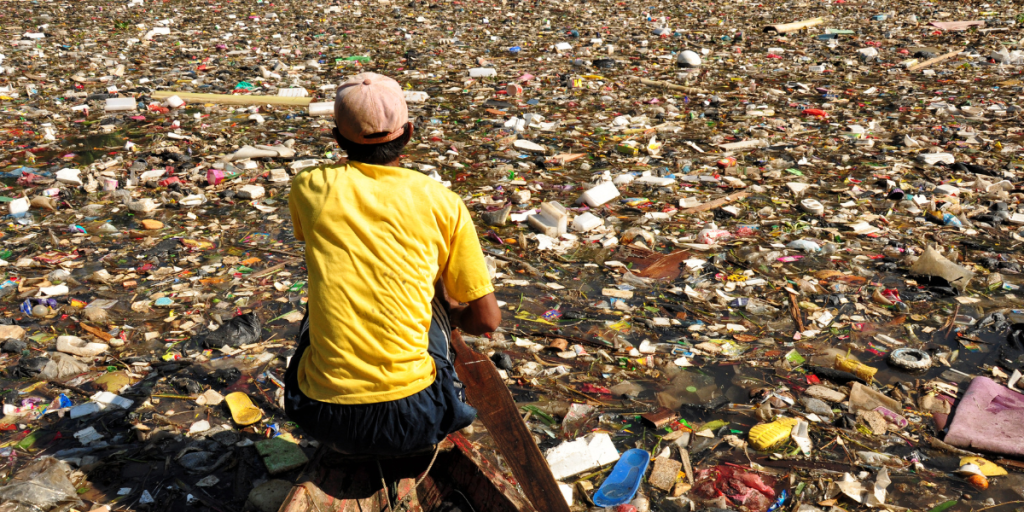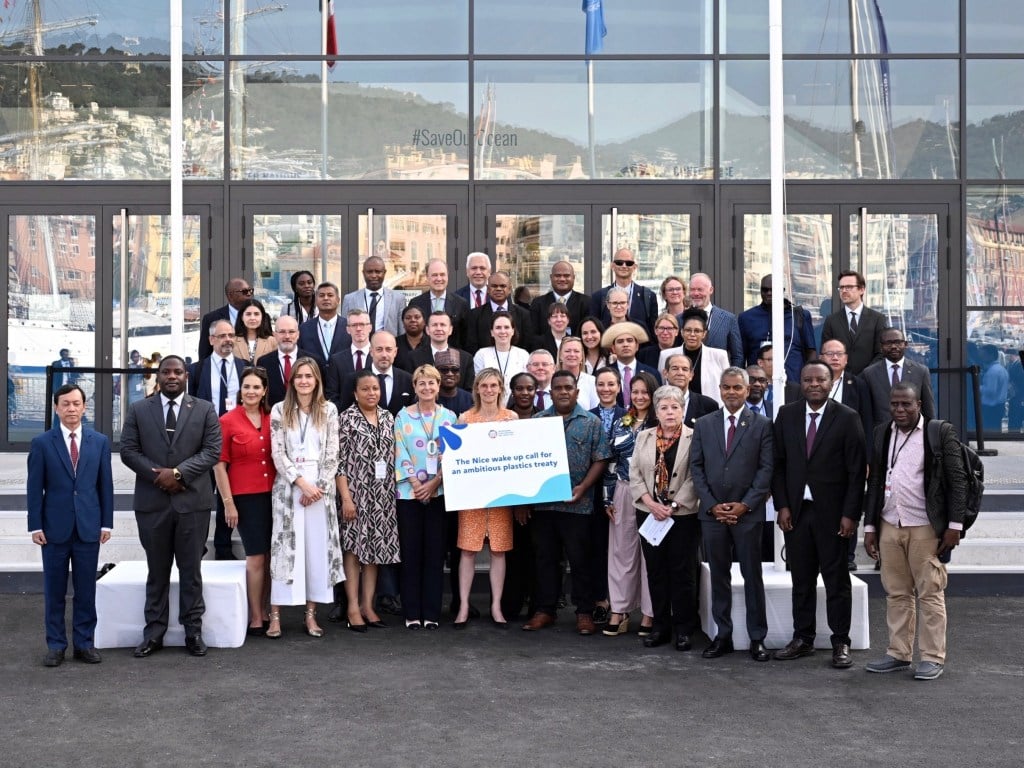Plastics treaty must address production
We cannot recycle our way out of the plastic pollution crisis

- Lena Yanina Estrada Añokazi, Minister of Environment and Sustainable Development, Colombia
- Hon. Mosese Bulitavu, Minister for Environment and Climate Change, Fiji
- Dr. Sivendra Michael, Permanent Secretary for Environment and Climate Change, Fiji
- Agnès Pannier-Runacher, Minister of Ecological Transition, Biodiversity, Forests, Sea and Fisheries, France
- Fazeela Ahmed Shaheem, Associate Legal Counsel, Ministry of Tourism and Environment, Maldives
- H.E. Andrew Yatilman, Secretary of the Department of Environment, Climate Change and Emergency Management, Federated States of Micronesia
- Juan Carlos Navarro, Minister of Environment, Panamá
- Juan Carlos Monterrey, Special Representative for Climate Change, Ministry of Environment, Panamá
Plastic pollution stretches from the peak of Mount Everest to the depths of our deepest oceans. It has been found in the stomachs of seabirds on remote Pacific islands, in the leaves of plants and in the fish we eat. Micro and nanoplastics are in our blood, our brains and in the fetuses of unborn children. The more than 4000 toxic chemicals found in plastics are affecting our endocrine systems and increasing our chances of developing cancers. Plastic is literally everywhere and it is impacting our health.
In 2022, the United Nations Environment Assembly agreed to develop an international legally binding instrument to end plastic pollution, including in the marine environment. Three years of negotiations will culminate in Geneva next month, as nearly 190 countries gather for the final round of negotiations on a global plastics treaty.
The Geneva talks will take place at a critical moment when multilateralism is under threat and the United Nations’ budget is under pressure. This could be the last chance to negotiate a plastics treaty that is fit for purpose for some time. We must seize the moment and prove to the world that working together, nations can still address the world’s most pressing problems.
What is at stake is no trivial matter. It is not simply about banning plastic straws and shopping bags—though that is something that sure is needed. Current levels of plastic production are the primary cause of plastic pollution. Since plastic was first mass-produced in the 1950s, production has grown exponentially, and along with it, plastic pollution. Globally, around 560 million tonnes of virgin plastic are produced annually and that number is expected to triple by 2060. Put simply: we must limit plastic production to end plastic pollution.
The oil industry and the major petroleum producers would have us believe that recycling is the solution. Yet even in wealthy countries, recycling rates have stagnated around 10%, and in some countries these rates have gone backwards. Wealthy countries export some of their plastic waste to developing countries where it is incinerated or put into landfills: supposedly out of sight, out of mind. Yet one thing is absolutely clear: we cannot recycle our way out of the plastic pollution crisis.

At the UN Oceans Conference in June 2025, 96 countries signed the Nice wake up call for an ambitious plastics treaty, representing a majority of the world’s states aligned on the critical elements of a plastics treaty that is fit for the purpose of ending plastic pollution. The first and arguably most important of these, is that we must address the full lifecycle of plastics, including both plastic production and consumption. The less plastic that is produced, the less pollution there will be.
Additionally, we must phase out the most problematic plastic products and the toxic chemicals they contain, starting with those which we cannot recycle —and which are harmful to humans. These lists of harmful products cannot remain stuck in time; they must evolve through multilateralism following rigorous scientific protocols. As industry research advances and plastic products develop, so too must the regulations that govern them.
The design of plastic products must be improved urgently in order to limit environmental harm and protect human health, reduce the amount of plastic used and increase the amount of recycled content. These steps are critical to circularity and for improving recycling globally.
Plastic pollution also disproportionately affects the most vulnerable populations, including Indigenous Peoples, waste pickers, women, and frontline and local communities. The treaty must ensure the protection of their rights.
Developing countries, including small island states, need effective means of implementation, including new, additional and accessible sources of finance. An ambitious treaty will only be effective if all states are willing and able to implement it. The global plastics treaty must be a living, breathing document that evolves over time, and it must come with legally binding measures. Voluntary measures alone will not cut it.
In the three years of negotiations to date, we have seen at times some countries simply refuse to negotiate in good faith. Wasting time using petty delaying tactics can no longer be tolerated.
Most states are travelling to Geneva with the intention of returning home with an effective treaty. Even if some states are not willing to come to the table, the process must go on. Humanity demands a treaty, and we must deliver now.
To those countries protective of their plastics production, keep in mind that no amount of profit will protect your citizens from the proven harm of toxic chemicals in plastic products or the plastic in their bloodstreams. The scourge of plastic pollution poses an existential risk to all, not just those of us who lead the call for a fit for purpose plastics treaty.
We will travel to Geneva with the voices of our citizens in our minds and in our hearts. We are drowning in plastic pollution, and a global, effective and immediate plastics treaty is our only option. We cannot and will not fail.
